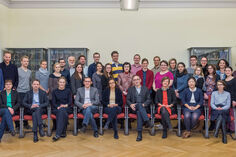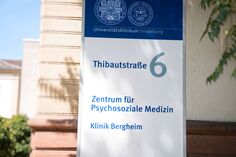Cognitive training for patients with depression
Have you ever suffered from a depressive episode in your life? Have you since then noticed problems to concentrate at work or to keep something in mind – though you aren’t so depressed anymore?
Then you may suffer from the so called „persistent cognitive deficits“, which can sometimes occur in patients with depression in the course of their life. Besides attention and memory other cognitive domains like information processing speed, inhibition or planning abilities can also be affected. Such cognitive deficits, which persist beyond the acute depressive episode, often lead to performance problems at work or problems in daily life, which in turn can predispose to a relapse of a depressive episode.
Based on this observation, we started a project (supported by the German Research Foundation (DFG)), which aims to evaluate the effect of cognitive training in patients who suffer from major depression and have persistent cognitive deficits.
The training is based on stimulating basic cognitive functions through specific practice at the computer (drill and practice method). Moreover, different kinds of learning strategies will be presented and discussed within additional group sessions to help participants apply the trained skills not only in the training sessions at the computer but also in everyday life.
Aim of the study
The aim of our DFG study is to examine the short and long term efficacy of cognitive training concerning cognitive performance as well as general everyday functioning in patients with major depression with persistent cognitive deficits. An individualized and a generalized training approach will be compared (n=22 each) with a passive control group (n=22). The participants of the training groups will be trained three times a week over a time period of 5 weeks. Evaluation will take place at three time points concerning cognitive performance and further variables (directly before and after the intervention as well as 6 months later). Additionally training effects on the neural networks will be examined in a subgroup of participants (n=40) by means of functional magnetic resonance imaging. In collaboration with the Department of Experimental Anesthesiology (Prof. Plaschke) and Institute of Pathology (Prof. J. Knopick) a sub-project investigating the effect of training on neuroplasticity using Biomarkers will be conducted. .
Project duration: 2,5 years (started in May 2014)

Examples for CogniPlus attention training modules used within our cognitive training.
Copyright: SCHUHFRIED GmbH
Research staff
Cognitive Training Study
| Name | Vorname | Titel |
| Roesch-Ely | Daniela | PD Dr. med. (head of the study) |
| Bartolovic | Marina | Dipl.-Psych. (Coordination) |
| Weinberg | Johanna | M.Sc.-Psych. |
| Kammeyer | Charlotte | M.Sc.-Psych. |
| Listunova | Olena | cand. psych. |
| Schölch | Daniel | Dr. med. (Biomarker Study) |
Imaging study
| Name | Vorname | Titel |
| Wolf | Robert Christian | Prof. Dr. med. (head of the study) |
| Bach | Claudia | M.A. |
| Depping | Malte | Dr. med. |
Colaboration
Prof. Dr. med. Matthias Weisbrod (SRH Klinikum Karlsbad-Langensteinbach)
Prof. Dr. med. Konstanze Plaschke (Department of Experimental Anesthesiology)
Prof. Dr. med. J. Knopick (Institute of Pathology )
Training Sessions & Contact
Location: Klinik für Allgemeine Psychiatrie, Haus 1, Computerraum
Monday 16:00-17:00 Uhr
Wednesday 16:00-17:30 Uhr
Friday 16:00-17:00 Uhr
Trainer: MSc. Psych. Johanna Weinberg & MSc. Psych. Isabelle Rek
If you are interested in study participation please call us at phone number 06221-56 36201 and we can make an appointment!
On our study flyer you can find further information like inclusion criteria
Download Flyer






